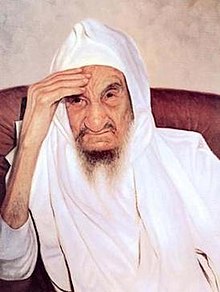Baba Sali: Difference between revisions
Runawayangel (talk | contribs) m fixed cs1 error |
Itamarhaim (talk | contribs) |
||
| Line 83: | Line 83: | ||
*{{webarchive |url=https://web.archive.org/web/20080207132438/http://www.famousrabbis.com/babasali.htm |date=February 7, 2008 |title=Famous Rabbis }} |
*{{webarchive |url=https://web.archive.org/web/20080207132438/http://www.famousrabbis.com/babasali.htm |date=February 7, 2008 |title=Famous Rabbis }} |
||
*[http://www.greenfieldjudaica.com/baba-sali--rabbi-yisrael-abuhatzeira---tiefenbrun-painting-TAC60.html Portrait of the baba Sali] |
*[http://www.greenfieldjudaica.com/baba-sali--rabbi-yisrael-abuhatzeira---tiefenbrun-painting-TAC60.html Portrait of the baba Sali] |
||
*[https://jewish.shop/baba-sali A story about the Baba Sali] |
|||
{{Authority control}} |
{{Authority control}} |
||
Revision as of 05:57, 17 May 2019
Rabbi Israel Abuhatzeira | |
|---|---|
 Baba Sali | |
| Title | Baba Sali |
| Personal life | |
| Born | September 12, 1889 |
| Died | January 8, 1984 (aged 94) |
| Spouse |
|
| Parent | Rabbi Mas'ud Abuhatzeira |
| Religious life | |
| Religion | Judaism |
| Jewish leader | |
| Successor | Baba Baruch |
Rabbi Israel Abuhatzeira (Template:Lang-he-n), known as the Baba Sali (Template:Lang-ar, Template:Lang-he-n, lit. "Praying Father") (1889–1984) was a leading Moroccan Sephardic rabbi and kabbalist who was renowned for his ability to work miracles through his prayers.[1] His burial place in Netivot, Israel has become a shrine for prayers and petitioners.
Early life
Rabbi Israel was the scion of a distinguished family of Sephardic Torah scholars and tzadikkim who were also known as baalei mofet (miracle workers). He is the grandson of Rabbi Yaakov Abu Hasira.[2] The patriarch of this family was Rabbi Shmuel Abuhatzeira. Born in the land of Israel, Rabbi Shmuel lived in Damascus for a while, where he studied Torah together with Rabbi Chaim Vital. In Shem Hagedolim, the Chida described Rabbi Shmuel as "an ish Elokim kadosh (a holy man of God). Wise people speak of his might and wonders in saving the Jewish community from many difficulties."
Rabbi Shmuel and his family eventually moved to the city of Tafilalt, Morocco, where Rabbi Shmuel's son Mas'ud (Moshe in Hebrew) became the rav of the city. Rabbi Mas'ud's son, Yaakov, known as the Avir Yaakov, succeeded his father as rabbi of Tafilalt. Rabbi Yaakov's eldest son, Mas'ud, became an av beit din in the same city, and it was here that his son, Yisrael, the Baba Sali, was born.[1]
Israel was born on Rosh Hashanah 5650 (1889) and grew up in a home permeated with Torah study and holy behavior. His family lived on a large estate which included a yeshiva where young scholars studied night and day. The beit din (rabbinical court) of his father, Rabbi Mas'ud, was also located on the premises. His older brother, Rabbi David, studied by himself in an attic. On the rare times that Rabbi Mas'ud traveled, he would cover his eyes with his cape to avoid seeing inappropriate sights.[1]
As a child, Yisrael was a diligent Torah scholar, studying day and night. At the age of 12, he began to fast during the six weeks of Shovavim. Knowing his parents would not let him continue, he hid his fasting from them, but his brother, David, noticed how weak and pale he was. Though David urged him to stop, Yisrael continued his fasting.[1]
After his bar mitzvah, he entered his family's yeshiva, where the students rose at midnight for Tikkun Chatzot and then studied Kabbalistic works until dawn, when they would go to the mikveh, pray the morning service, and eat breakfast. This was followed by in-depth Gemara study, the afternoon prayers, and a shiur in Shulchan Aruch.[1]

Funeral and tomb
He died in 1984 (4 Shevat 5744). His funeral was attended by an estimated 100,000 people. His gravesite in Netivot has become a popular pilgrimage site in Israel. On the anniversary of his death, thousands come to visit his tomb and pray.[3]
References
- ^ a b c d e "The Baba Sali, Rav Yisrael Abuhatzeira, zt"l". Re-Printed (at www.torahcenter.com) (i.e., the [then] web site of the Ahi Ezer Torah Center) with permission from Yated Ne'eman on or before [the "archived" date, which was] December 4, 2005. Note that the "Retrieved" date of August 24, 2015 is NOT for the "original" (www.torahcenter.com) URL, but rather is for the copy at the "archive" URL (at web.archive.org). Archived from the original on December 4, 2005. Retrieved August 24, 2015.
{{cite web}}: Unknown parameter|deadurl=ignored (|url-status=suggested) (help) - ^ http://www.themedialine.org/news/news_detail.asp?NewsID=30952 Israeli Pilgrims to Egyptian Grave Met With Hostility, David E. Miller, December 28, 2010.
- ^ "Baba Sali". Go Israel. Retrieved 14 December 2011.
External links
- Baba Sali Foundation
- Famous Rabbis at the Wayback Machine (archived February 7, 2008)
- Portrait of the baba Sali
- A story about the Baba Sali
